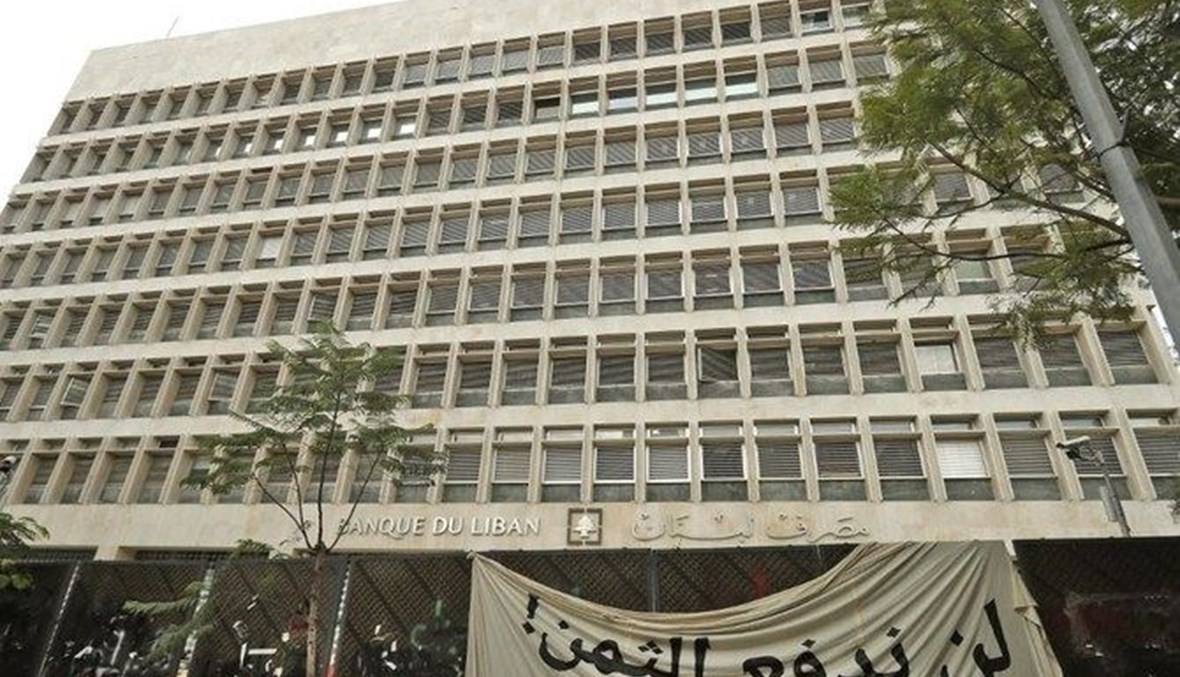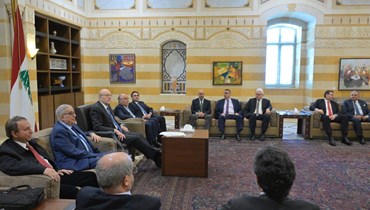Government lending to BDL pushed Lebanon over the edge
05-10-2020 | 15:48
Source: Annahar
BEIRUT: Lebanon’s government for years was lending dollar funds to the central bank, contrary to the popular belief that the origin of Lebanon’s financial collapse is the central bank’s lending to the government, according to a study from Dr. Toufic Gaspard.
Gaspard, who began sounding the alarm in 2017, noted in his latest policy paper published this week that an important source of dollar funds for Banque Du Liban was its holding of Eurobonds issued by the Ministry of Finance, which BDL subsequently sold in the market.
“In other words, it was the MOF that was, in fact, supplying BDL with $ funds, to the tune of $17.5 billion until 2019, rather than the other way around,” Gaspard noted.
“So BDL’s LL-financing of government debt through its holdings of LL-TBs was, importantly for BDL, a mechanism to obtain dollar funds from Government through its regular exchanging of these LL-TBs for Eurobonds that it subsequently sold to banks”, the economist added.
The dominant and recurring discourse in Lebanon that the banking collapse is due to the banks’ and BDL’s financing of government debt is therefore “incorrect and unsubstantiated”, Gaspard argued.
“Worse, without the exchange of Eurobonds for LL-TBs, Lebanon’s dollar debt in Eurobonds would have been lower by at least $25 billion (the exchanged amount plus accumulated interest) to about $5 billion only at end September 2019.
The upshot would have been that, had it not been for BDL’s exchange operation, Lebanon’s first-ever default could then have been avoided, and the whole financial landscape would have been today radically different for the better.”
Lebanon defaulted on its debt obligations in April after it the debt reached $90 billion or 170% of GDP making it one of the highest in the world. The total debt and interest Lebanon had to pay back in 2020 reached $4.6 billion.
During the period between 2009 and 2019, around $30 billion left the central with these dollar funds largely corresponding to bank profits (in both $ and LL) that mainly originated from BDL’s “financial engineering” operations, and where the LL-part was converted into $ through BDL and transferred abroad, Gaspard said.
“Banks’ profits largely are the mirror image of BDL’s losses,” he added.
To overcome the crisis, Gaspard calls on Lebanon to regain its sovereignty, which entails both the economic and military policy.
“The loss of sovereignty is the most harmful for there is no hope of any recovery without regaining one’s sovereignty over national territory and policies,” Gaspard said.
“Lebanon has lost its political and military sovereignty to Iran through the Lebanese party Hezbollah, which holds sway over Lebanon’s Government and openly runs a large army of its own that has been for years conducting military operations in Syria and other Arab countries,” Gaspard added.
Hezbollah, along with Shiite ally Amal, have hindered the formation of an independent government for almost two months.
Lebanon’s government should also “introduce a 3-year budget, say for 2021-23, with a gradually declining deficit to reach close to balance in 2023. This should constitute the first action, or signal, by Government in the process of economic reform.
Gaspard, who began sounding the alarm in 2017, noted in his latest policy paper published this week that an important source of dollar funds for Banque Du Liban was its holding of Eurobonds issued by the Ministry of Finance, which BDL subsequently sold in the market.
“In other words, it was the MOF that was, in fact, supplying BDL with $ funds, to the tune of $17.5 billion until 2019, rather than the other way around,” Gaspard noted.
“So BDL’s LL-financing of government debt through its holdings of LL-TBs was, importantly for BDL, a mechanism to obtain dollar funds from Government through its regular exchanging of these LL-TBs for Eurobonds that it subsequently sold to banks”, the economist added.
The dominant and recurring discourse in Lebanon that the banking collapse is due to the banks’ and BDL’s financing of government debt is therefore “incorrect and unsubstantiated”, Gaspard argued.
“Worse, without the exchange of Eurobonds for LL-TBs, Lebanon’s dollar debt in Eurobonds would have been lower by at least $25 billion (the exchanged amount plus accumulated interest) to about $5 billion only at end September 2019.
The upshot would have been that, had it not been for BDL’s exchange operation, Lebanon’s first-ever default could then have been avoided, and the whole financial landscape would have been today radically different for the better.”
Lebanon defaulted on its debt obligations in April after it the debt reached $90 billion or 170% of GDP making it one of the highest in the world. The total debt and interest Lebanon had to pay back in 2020 reached $4.6 billion.
During the period between 2009 and 2019, around $30 billion left the central with these dollar funds largely corresponding to bank profits (in both $ and LL) that mainly originated from BDL’s “financial engineering” operations, and where the LL-part was converted into $ through BDL and transferred abroad, Gaspard said.
“Banks’ profits largely are the mirror image of BDL’s losses,” he added.
To overcome the crisis, Gaspard calls on Lebanon to regain its sovereignty, which entails both the economic and military policy.
“The loss of sovereignty is the most harmful for there is no hope of any recovery without regaining one’s sovereignty over national territory and policies,” Gaspard said.
“Lebanon has lost its political and military sovereignty to Iran through the Lebanese party Hezbollah, which holds sway over Lebanon’s Government and openly runs a large army of its own that has been for years conducting military operations in Syria and other Arab countries,” Gaspard added.
Hezbollah, along with Shiite ally Amal, have hindered the formation of an independent government for almost two months.
Lebanon’s government should also “introduce a 3-year budget, say for 2021-23, with a gradually declining deficit to reach close to balance in 2023. This should constitute the first action, or signal, by Government in the process of economic reform.
“The corrective measures should include minimal increases in taxes and fees, and rely essentially on reducing much inflated or wasteful expenditures, and recovering unrealized budget revenues.”
Finally, Lebanese banks should recapitalize, as no “economic recovery is possible without a functioning banking system that would, above all, re-engage with normal business activity, such as opening letters of credit, and setting clear operational rules regarding deposits and transfers, etc.”
“This normalization of banking operations, and economic activity in general, cannot take place without the recapitalization of banks whose consolidated equity is currently negative,” Gaspard said.


 اشترِك في نشرتنا الإخبارية
اشترِك في نشرتنا الإخبارية











